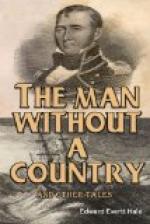“Come over and help us.” Give us life, for we gave you death. Give us help for we gave you ruin. Paul was not disobedient to the heavenly vision. The Christian Alexander, he crosses to Macedon with the words of peace instead of war,—the Christian shepherd of the people, he carries to Greece, from Troy, the tidings of salvation instead of carnage, of charity instead of license. And he knows that to Europe it is the beginning of her new civilization, it in the dawn of her new warfare, of her new poetry, of her reign of heroes who are immortal.
That faith of his, now years old, has this day received its crowning victory. This day, when he has faced Nero and Seneca together, may well stand in his mind as undoing centuries of bloodshed and of license.
And in this effort, and in that spiritual strength which had nerved him in planning it and carrying it through, was the “Asian mystery.” Ask what was the secret of Paul’s power as he bearded the baby Emperor, and abashed the baby Philosopher? What did he give the praise to, as he left that scene? What was the principle in action there, but faith in the new life, faith in the God who gave it!
We do not wonder, as Seneca wondered, that such a man as Paul dared say anything to such a boy as Nero! The absolute courage of the new faith was the motive-power which forced it upon the world. Here were the sternest of morals driven forward with the most ultra bravery.
Perfect faith gave perfect courage to the first witnesses. And there was the “mystery” of their victories.
And so, in this case, when after a while Seneca again reminded Nero of his captive, poor Nero did not dare but meet him again. Yet, when he met him again in that same judgment-hall, he did not dare hear him long; and we may be sure that there were but few words before, with such affectation of dignity as he could summon, he bade them set the prisoner free.




